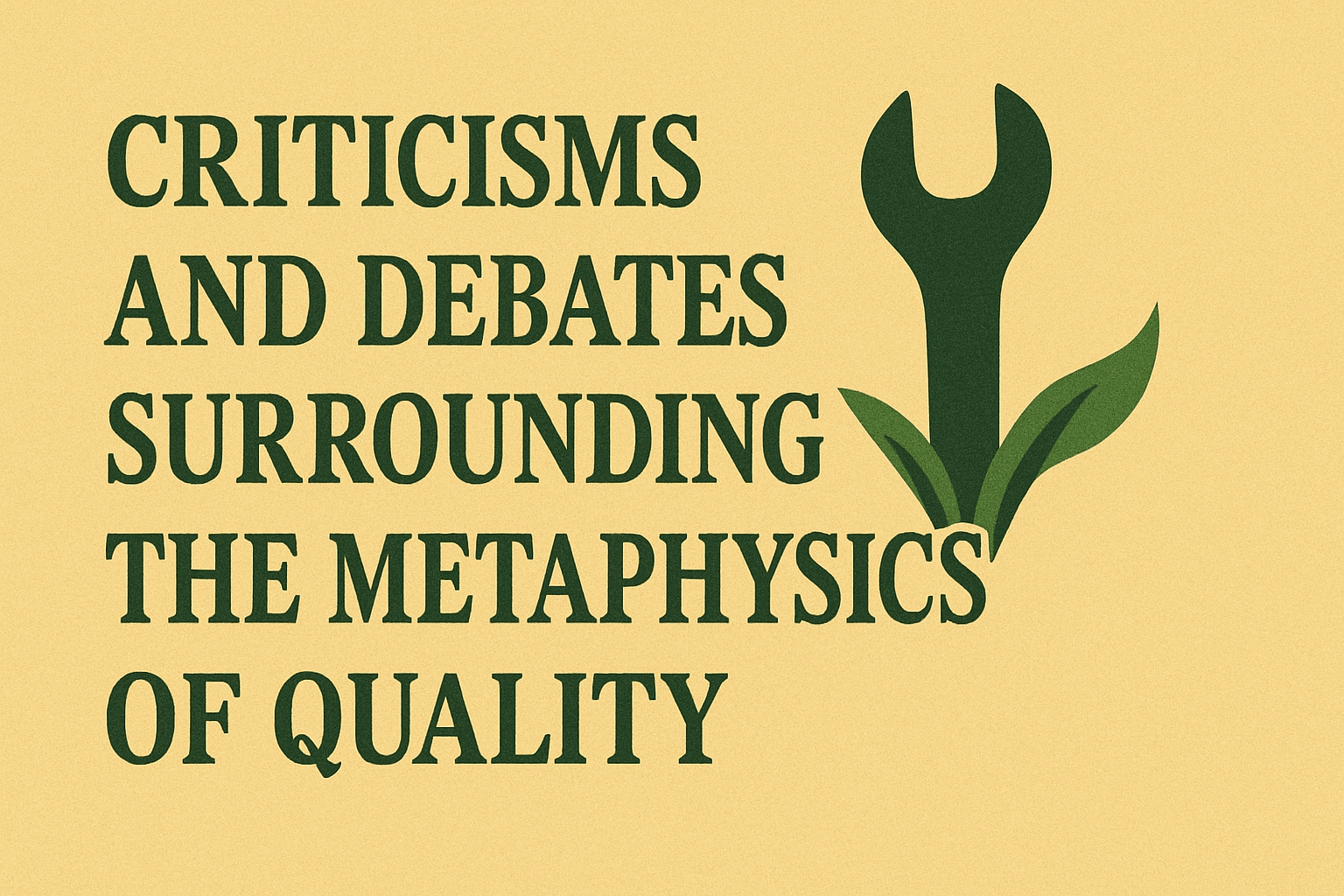An exploration of the criticisms and debates that Pirsig’s work has generated, including discussions on its coherence, applicability, and philosophical rigour.
Robert M. Pirsig’s Metaphysics of Quality (MOQ), introduced in his influential works Zen and the Art of Motorcycle Maintenance and Lila: An Inquiry into Morals, has inspired considerable discussion and debate within philosophical circles. While many have praised Pirsig’s innovative approach to understanding quality and reality, his work has also faced criticism regarding its coherence, applicability, and philosophical rigor. This article explores the primary criticisms and debates surrounding the Metaphysics of Quality.
Coherence and Conceptual Clarity
One of the primary criticisms of the Metaphysics of Quality concerns its coherence and conceptual clarity. Critics argue that Pirsig’s definition of quality as the fundamental reality is ambiguous and lacks precise delineation.
- Ambiguity of Quality: Some philosophers contend that Pirsig’s concept of quality is too vague to serve as a foundational principle. They argue that quality is inherently subjective and context-dependent, making it difficult to pin down a universal definition.
- Philosophical Vagueness: Pirsig’s integration of quality into a metaphysical framework has been criticized for its philosophical vagueness. Critics argue that while the idea is intriguing, it lacks the rigor and precision expected in traditional philosophical discourse.
- Response to Criticism: Defenders of Pirsig argue that the very nature of quality resists rigid definitions and that its fluidity is part of its philosophical strength. They claim that the ambiguity allows for a more holistic understanding of reality, which is not confined by traditional binary distinctions.
Applicability and Practicality
Another area of debate centers around the applicability and practicality of Pirsig’s Metaphysics of Quality in real-world contexts.
- Implementation Challenges: Critics question how the abstract principles of MOQ can be effectively applied in practical situations, such as business, education, and personal development. They argue that without clear guidelines for implementation, the concept remains largely theoretical.
- Scalability: There is also skepticism about the scalability of Pirsig’s ideas. While the pursuit of quality can be compelling on an individual level, critics doubt whether it can be applied consistently across larger systems and institutions.
- Response to Criticism: Supporters of Pirsig assert that the Metaphysics of Quality provides a valuable philosophical foundation that can inspire practical approaches, even if it does not offer specific instructions. They argue that the pursuit of quality can lead to innovative solutions tailored to different contexts and challenges.
Philosophical Rigor
The philosophical rigor of the Metaphysics of Quality has been a focal point of debate, with some scholars questioning its consistency and depth.
- Integration with Established Philosophies: Critics argue that Pirsig’s work does not adequately engage with established philosophical traditions, such as analytic philosophy or continental philosophy. They claim that the MOQ lacks the depth of analysis and argumentation found in more established philosophical works.
- Logical Consistency: There are concerns about the logical consistency of Pirsig’s ideas, particularly regarding the integration of Eastern and Western philosophical concepts. Critics argue that the attempt to merge these traditions sometimes leads to contradictory or incoherent positions.
- Response to Criticism: Proponents contend that Pirsig’s work should be appreciated for its innovative and interdisciplinary approach. They argue that his blending of different philosophical traditions is a strength, offering fresh perspectives that challenge conventional thinking and encourage intellectual exploration.
Subjectivity and Objectivity
Pirsig’s rejection of the traditional subject-object dichotomy in favor of quality as the primary reality has sparked considerable debate.
- Subjective Nature of Quality: Critics argue that quality is inherently subjective, shaped by individual perceptions and experiences. They question whether it can serve as an objective foundation for understanding reality.
- Objectivity in Philosophy: Traditional philosophy often seeks objective truths that are independent of individual perspectives. Pirsig’s focus on quality, which blends subjectivity and objectivity, challenges this paradigm, leading to debates about its philosophical validity.
- Response to Criticism: Advocates of Pirsig’s approach suggest that his rejection of strict objectivity reflects a more nuanced understanding of reality. They argue that quality encompasses both subjective experiences and objective elements, providing a richer, more integrated view of existence.
Influence and Legacy
Despite the criticisms, Pirsig’s Metaphysics of Quality has had a significant impact on contemporary philosophy and beyond.
- Interdisciplinary Influence: Pirsig’s ideas have resonated across various disciplines, including psychology, education, business, and environmental studies. His emphasis on quality has inspired new approaches and practices in these fields.
- Cult Following: Pirsig’s work has developed a dedicated following, with readers and scholars finding profound personal and intellectual inspiration in his writings. The MOQ has sparked ongoing discussions and explorations, reflecting its lasting influence.
- Philosophical Contributions: While not universally accepted within academic philosophy, Pirsig’s work has contributed to broader philosophical discourse by challenging conventional boundaries and encouraging interdisciplinary dialogue.
Conclusion
Robert M. Pirsig’s Metaphysics of Quality continues to generate significant debate and discussion within philosophical circles. While criticisms regarding its coherence, applicability, and philosophical rigor persist, the MOQ’s innovative approach to understanding quality and reality has left a lasting impact. By challenging traditional paradigms and offering a holistic perspective, Pirsig’s work invites ongoing exploration and reflection, ensuring that the debates surrounding the Metaphysics of Quality remain vibrant and relevant.
